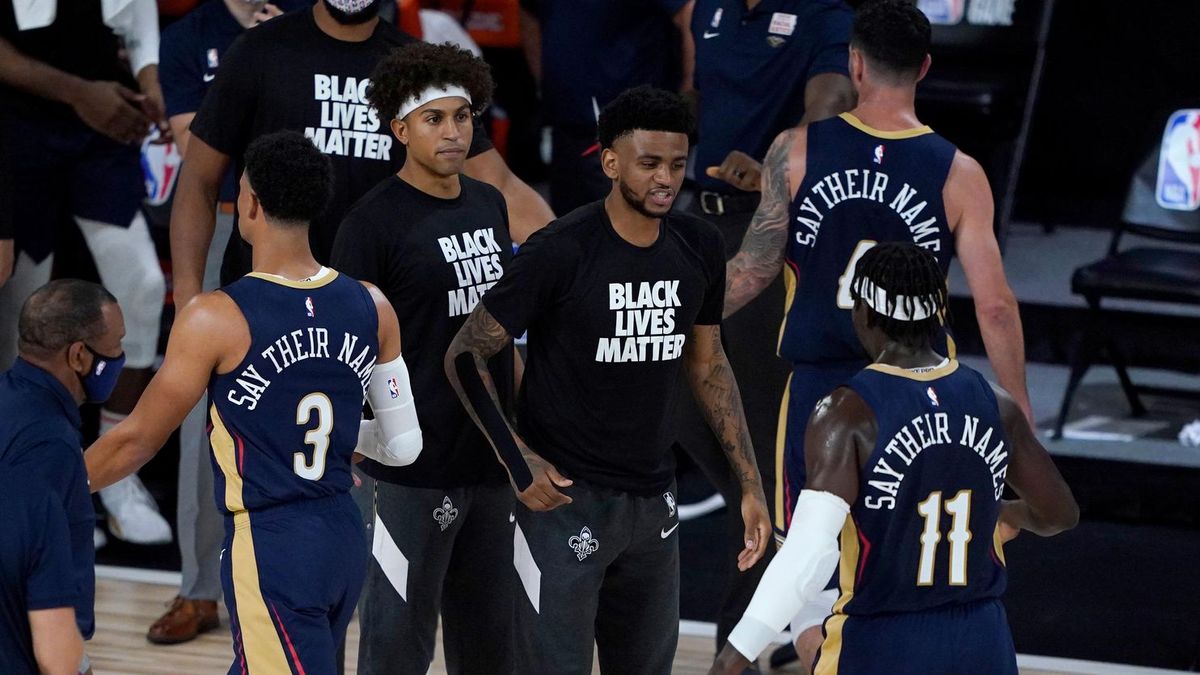Are professional sports in America becoming too political?

A few minutes every morning is all you need.
Stay up to date on the world's Headlines and Human Stories. It's fun, it's factual, it's fluff-free.
Since the coronavirus crisis took hold in the United States, many aspects of social life have been altered, postponed or canceled, including professional sports.
The Major League Baseball (MLB) season usually starts in late March but was postponed indefinitely until late July. The National Basketball Association (NBA) suspended its season in March and then resumed at the end of July with a reduced schedule.
The NBA decided to play its games at Walt Disney World’s facilities in Orlando, Florida in an attempt to resume the season while keeping players safe. So far it seems to be working. In what has become known as the “NBA Bubble,” as of early August the NBA has reported no confirmed coronavirus cases, which not only included players but also coaches and staff.
The MLB hasn’t fared as well as the NBA in reducing coronavirus transmissions. Several teams have had to make roster changes after players were confirmed to have the virus, including an outbreak on the Miami Marlins which saw at least 16 players test positive.
The outbreak has some wondering whether the season is in jeopardy. As for America’s favorite sport, football, with the National Football League (NFL) season around the corner there is concern among some players and staff that executives aren’t doing enough to combat the virus.
Sports and social justice
This year, however, debates surrounding America’s professional sports leagues go beyond the pros and cons of playing during a pandemic. With an awakened social justice movement in the US having emerged this summer in the wake of George Floyd’s death, some sports leagues are making changes.
The NBA is allowing social justice slogans connected to the Black Lives Matter movement to be printed on their jerseys, including “I Can’t Breathe,” “Say Their Names,” and even “Vote,” which is arguably a message advocating for the ouster of President Trump and his allies.
The Women’s National Basketball Association, meanwhile, has dedicated their season to Breonna Taylor, a Black woman killed by police in Louisville, Kentucky in March.
In addition, while professional football has seen its fair share of political acts in recent years over Colin Kaepernick and the decision players made to kneel during the national anthem before games to emphasize racial inequality, the NFL has more recently decided to change the name of one of it teams, the Washington Redskins, due to what some say was a clear example of racial insensitivity.
A political turn?
Although American sports are usually viewed as ostensibly apolitical, they remain widely popular and influential aspects of American culture.
According to a Gallup poll in 2015, about 60% of Americans call themselves sports fans, a number that not only drives economic activity but also cultural activity. Reports indicate that in 2018 the NFL alone made US$8.1 billion in revenue, representing a number larger than the total gross domestic product of some poorer nations.
Although some proponents of social justice in the US applaud the recent changes made by professional sports leagues, claiming that it adds visibility and legitimacy to the movement, others are more critical.
For Charles Barkley, a retired Hall-of-Fame basketball player turned commentator, while the issues are important, there is a risk of commercialization and debasement if America’s sports leagues aim to superficially conform to the social zeitgeist.
“We need police reform, we need prison reform,” Barkley told CNBC in July. “My concern is turning this into a circus instead of trying to do some good stuff.”
Others argue that keeping politics out of sports is a futile endeavor since issues surrounding social justice have been a notable aspect of American professional sports for decades, especially for Black athletes.
Major League Baseball, for example, was a racially segregated sport for generations. In 1947, Jackie Robinson broke the color barrier in the league, becoming a star player for the Brooklyn Dodgers.
At the time, Robinson’s inclusion in America’s premier baseball league was highly contested.
“The (idea of) stick to sports, it’s never existed in the first place for Black athletes. They’ve never been able to stick to sports. They’ve never wanted to,” argued Howard Bryant, a senior writer with ESPN, an American sports media network.
In a conversation with Bryant over the argument that athletes should stay out of politics, Dontrelle Willis, a former MLB player who is now a broadcaster, said he felt it was belittling to argue that players should stay quiet on issues that matter to them.
“It’s insulting, because now you’re telling a person, ‘You’re not smart enough to know what’s going on right now. You’re not smart enough to know …’” he argued.
Have a tip or story? Get in touch with our reporters at tips@themilsource.com




Comments ()